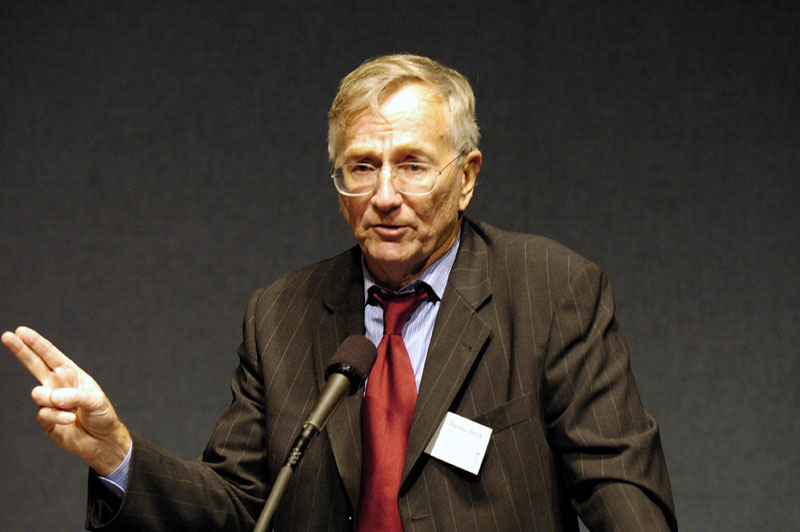
Seymour Hersh, the American journalist who wrote an error-strewn article about the chemical attack on Khan Sheikhoun in Syria, is this year's winner of an annual prize for truth-telling. He is due to be presented with the Sam Adams Award for Integrity on September 22 during a conference at the American University in Washington.
The citation makes clear that he is being honoured specifically for his article about Khan Sheikhoun which was published by the German news organisation Welt in June and has since been thoroughly discredited.
The citation says:
"This year’s award goes to renowned Pulitzer prize-winning journalist, Seymour Hersh, for his most recent report earlier this year on President Donald Trump’s lie that a Syrian aircraft carried out a 'chemical weapons attack' in Syria’s Idlib Province on April 4."
Hersh's article attempted to explain away dozens of deaths from the nerve agent sarin by suggesting that Syrian forces using a conventional explosive bomb had accidentally hit a store of "fertilisers, disinfectants and other goods" causing "effects similar to those of sarin".
Laboratory tests supervised by the Organisation for the Prohibition of Chemical Weapons (OPCW) later confirmed that sarin had indeed been used. Yesterday, a report from a UN Commission of Inquiry concluded that the sarin attack had been carried out by the Syrian air force, and that this consituted a war crime and a violation of the Chemical Weapons Convention.
Hersh's "fertiliser" theory, which was not scientifically feasible, was the most serious error in his thinly-sourced article but there were other problems with it too (see here and here).
Subsequently, Hersh declined to engage in discussion about his article and responded to one journalist's questions by saying that in his long career he had "learned to just write what I know and move on".
Hersh, who won a Pulitzer prize for journalism 47 years ago, has done valuable reporting in the past. He exposed the Mai Lai massacre in Vietnam back in 1969 and, more recently, the horrors of Abu Ghraib prison in Iraq. Some of his other exposés have misfired, though, and he has often been criticised for his use of shadowy sources. In the words of one Pentagon spokesman, Brian Whitman, he has "a solid and well-earned reputation for making dramatic assertions based on thinly sourced, unverifiable anonymous sources".
Another complaint about his more recent work is that he spends too much time listening to his unidentified sources and not enough looking at open-source evidence which points in a different direction. In an earlier article where Hersh suggested the Assad regime had not been responsible for Sarin attacks near Damascus in 2013, he either overlooked or disregarded evidence which didn't fit his argument and posed a number of questions which other writers had already answered.
His 2013 article was rejected by the New Yorker magazine and eventually published in Britain by the London Review of Books. However, the London Review of Books rejected his most recent article on Syria – which is why it ended up being published in Germany.
Hersh's admirers (of whom there are many on social media) discount the most likely reason for these rejections – that his editors found the articles flaky – in favour of a media conspiracy, and the organisers of the Sam Adams prize seem to have adopted a similar view.
The award citation continues:
"Despite his reputation and the importance of the story, Hersh tried in vain to find a US or British outlet that would publish his report, and eventually ended up having to go to the mainstream German newspaper Die Welt to get the results of his investigation published.
"The common challenge we all face is getting such information into media outlets that US citizens regularly access. Encouragement comes from Hersh’s example of grit, integrity and tenacity, which have already had a powerful influence on Sam Adams Associates. In sum, this year’s awardee is a wonderfully good fit."
Previous winners of the award have included Julian Assange, Edward Snowden and Chelsea Manning.

 RSS Feed
RSS Feed
